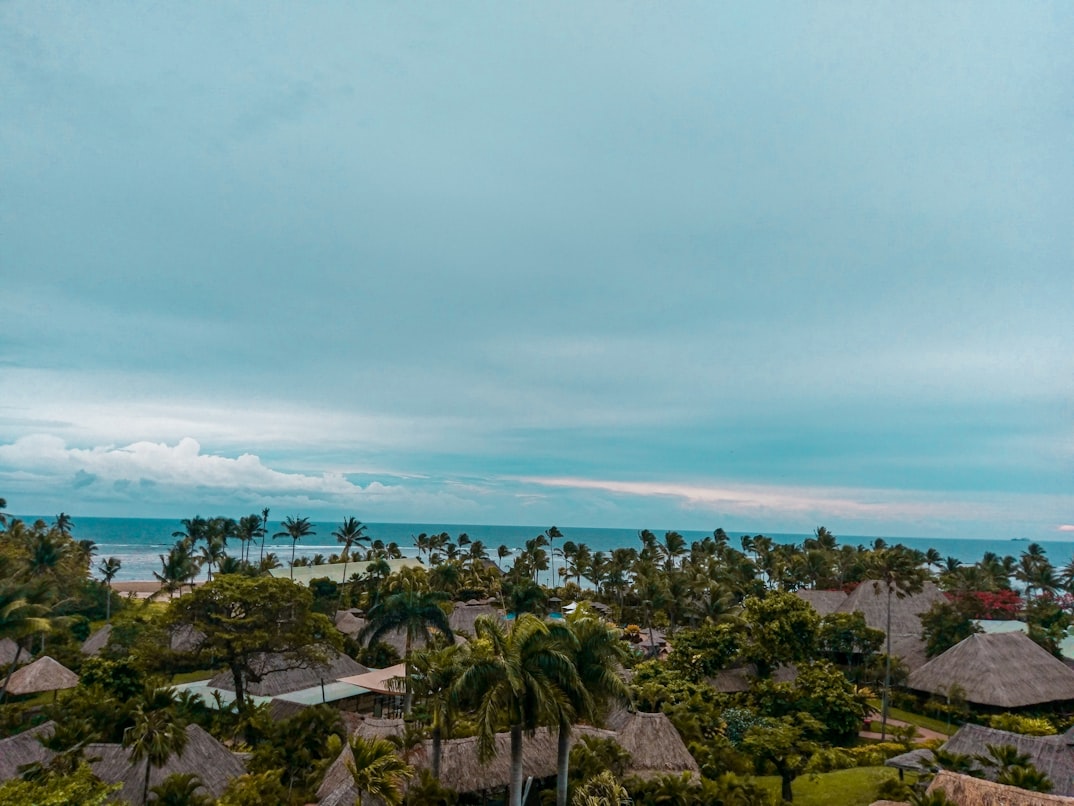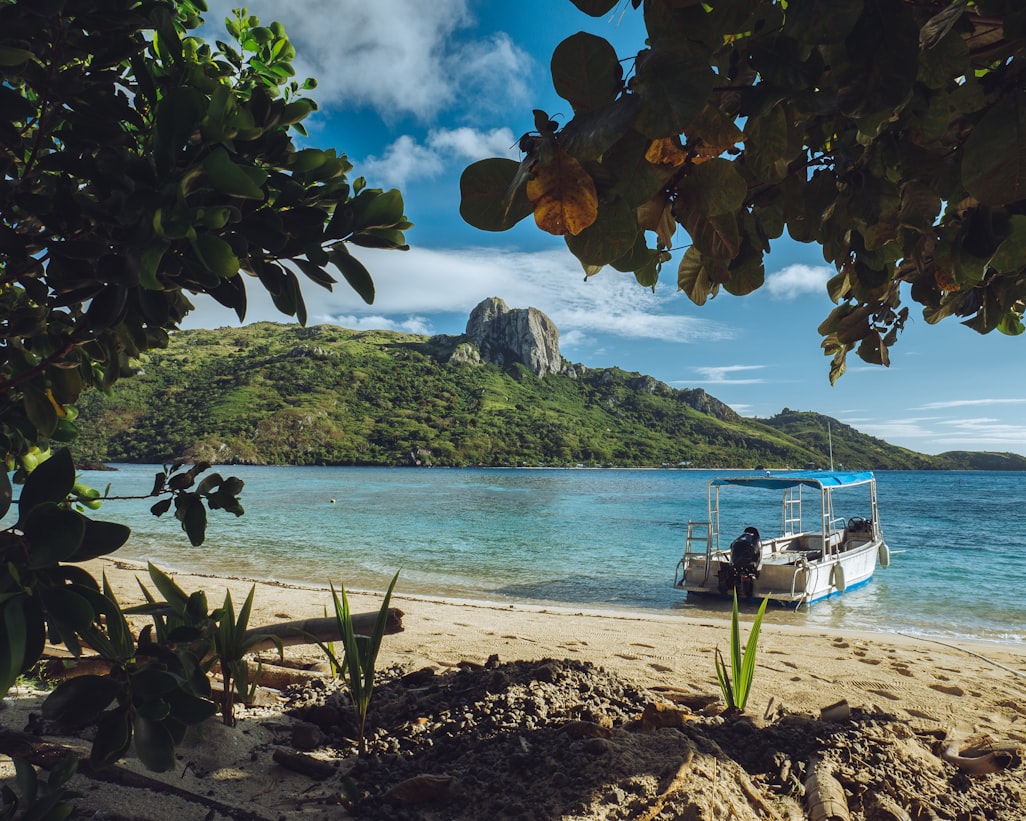Top Attractions
Fiji is renowned for its idyllic island landscapes and diverse natural beauty. One of the most iconic spots is the Yasawa Islands, a string of sun-drenched islands with turquoise lagoons, soft white sands, and thriving coral reefs perfect for snorkeling and diving. Viti Levu, the main island, is home to the capital city Suva and the Coral Coast—an area rich with cultural villages, waterfalls like Biausevu, and family-friendly resorts. Be sure to visit the Garden of the Sleeping Giant, a lush orchid garden nestled at the base of a dormant volcano near Nadi, showcasing Fiji’s vibrant flora. For those seeking adventure, a trip to the remote Taveuni Island offers hiking through the Bouma National Heritage Park, complete with jungle trails and hidden waterfalls.
Local Dishes
Fijian cuisine is a flavorful blend of indigenous, Indian, and Pacific influences. A must-try traditional dish is Kokoda, a Fijian ceviche made from raw fish marinated in citrus and coconut cream, often served in a coconut shell. Lovo is another cultural highlight—it’s an underground oven-cooked feast of meats, taro, and vegetables, seasoned and wrapped in banana leaves for hours of slow cooking. Roti parcels filled with curry, cassava chips, and Indian-style dhal soup reflect the Indian influence found across the islands. Tropical fruits like papaya, pineapple, and breadfruit are staples, and desserts often feature coconut milk and banana fritters. Visitors should also sample yaqona (kava), a traditional drink made from the root of the kava plant, known for its calming effects.
Transportation Tips
Fiji's islands are best explored with a mix of transportation methods depending on the region. On Viti Levu and Vanua Levu, buses are the most economical and commonly used public transport, running regular routes between towns and villages. Taxis are affordable and widely available, especially around Nadi and Suva, but always agree on a fare or ensure the meter is used. For island-hopping, high-speed catamarans like the Yasawa Flyer connect major islands and resorts efficiently. Seaplanes and domestic flights provide faster and more scenic travel for remote destinations. Renting a car is possible but roads can be bumpy and driving is on the left side, so caution is advised. Ferries are also a slower but scenic and budget-friendly option for inter-island transport.
Budget Travel Tips
Budget-conscious travelers can enjoy Fiji by staying in affordable guesthouses, backpacker resorts, or dorm-style accommodations available on both large and smaller islands. Meal costs can be reduced by shopping at local markets or eating from small local eateries called “canteens,” where food is delicious and prices are reasonable. Consider island passes or bundle deals for transport and accommodation to explore the Yasawas or Mamanucas without overspending. Tap water is generally safe on main islands, but bringing a reusable water bottle with a filter helps avoid bottled water purchases. Public transportation and shared boat charters can also stretch your budget further. Booking tours or experiences in person, rather than online in advance, often yields better deals.
Safety Info
Fiji is generally a safe country for travelers, with friendly locals and low levels of violent crime. However, petty theft can occur, especially in urban areas, so always keep valuables secured and avoid isolated areas at night. Cyclone season requires travelers to monitor weather updates and follow local advice. Some remote islands may have limited medical access, so travel insurance and a basic first-aid kit are strongly recommended. It's also important to respect local customs and dress modestly when visiting villages or attending ceremonies. When swimming, be cautious of strong currents and jellyfish during the wet season.
Cultural Etiquette
Fijian culture is deeply rooted in respect and community. When visiting a village, it is customary to participate in a sevusevu ceremony, where guests present a gift of kava to the village chief to formally gain welcome. Dress modestly when entering villages—women should wear a sulu (sarong), and shoulders and knees should be covered. Always remove hats and sunglasses as a sign of respect in villages. Fijians are warm and hospitable, and a simple greeting of “Bula!” goes a long way in building rapport. Avoid touching someone’s head, as it is considered sacred, and be mindful not to point your feet toward people or religious objects.
Travel Style Fit
Fiji caters well to romantic honeymooners, laid-back beach lovers, adventure seekers, and cultural explorers alike. It's ideal for travelers who want a relaxed, barefoot luxury experience but also offers exciting adventures like ziplining, diving with sharks, and island trekking. Solo travelers will find the backpacker circuit friendly and connected, while families and couples can enjoy the safety, calm beaches, and all-inclusive resorts. Fiji’s charm lies in its warmth—not just in weather, but in its people and lifestyle.

Best Time to Visit
The best time to visit Fiji is during its dry season, from May to October, when the weather is sunny, humidity is lower, and temperatures are pleasant for beach and outdoor activities. This period also coincides with peak tourist season, so accommodations may be pricier. The wet season from November to April brings hotter, more humid conditions with occasional tropical storms or cyclones, though prices tend to be lower and crowds thinner. Travelers interested in cultural festivals should aim for June’s Bula Festival in Nadi or the Hibiscus Festival in Suva in August, both of which feature parades, music, and traditional performances.
Accommodation Recommendations
For low-budget travelers, Bamboo Backpackers in Nadi offers dorms and private rooms near the beach and a lively social atmosphere. Another option is the Barefoot Manta Island Resort, which has eco-friendly dorms and affordable beachfront bures with great snorkeling.
For mid-range travelers seeking a bit more comfort, the Uprising Beach Resort on Pacific Harbour combines value with style, offering spacious bures, a beachfront bar, and cultural activities. Blue Lagoon Beach Resort in the Yasawas also provides well-appointed rooms with full board included.
Luxury travelers will find exquisite options like Likuliku Lagoon Resort, an adults-only haven with overwater bungalows and gourmet cuisine, or the Vatuvara Private Islands resort, offering personalized service and exclusivity amid unspoiled beauty.
Languages Spoken
Fiji has three official languages: English, Fijian, and Fiji Hindi. English is widely spoken in urban areas and is the language of education, business, and tourism, making it easy for travelers to navigate. In rural villages and outer islands, Fijian is predominantly spoken, and learning a few basic phrases such as “vinaka” (thank you) or “moce” (goodbye) is appreciated. Fiji Hindi is spoken by Indo-Fijians, particularly in the western regions.
Currency
The official currency in Fiji is the Fijian Dollar (FJD). ATMs are available in towns and tourist hubs like Nadi and Suva, but may be limited on smaller islands. Credit cards are widely accepted at resorts and larger businesses, though cash is essential for local markets, buses, and smaller villages. Currency exchange is available at the airport, banks, and exchange bureaus. It's a good idea to carry smaller denominations for ease of use in rural areas.
Common Traveler Mistakes to Avoid
One common mistake is underestimating how long it takes to reach certain islands—plan buffer time between ferries or flights. Travelers sometimes forget to bring enough cash when heading to remote islands, where card machines might be unavailable. Additionally, packing too lightly for the heat without accounting for modest dress expectations in villages can result in unintentional disrespect. Booking accommodations or transport too last-minute during the peak season can also leave you stranded or overpaying.
Essential Apps & Tools
Download the “Fiji Travel” app for curated information on attractions, tours, and safety alerts. Offline maps like Maps.me or Google Maps with downloaded regions are crucial for navigating remote areas. Currency converters like XE help with budgeting, and booking tools like Bookaway or Awesome Adventures Fiji can streamline ferry and tour logistics. WhatsApp is widely used for local communication and confirming tour pickups or accommodations.
Suggested Itinerary Styles
Start your journey on Viti Levu with a day exploring Nadi’s markets and temples, then head to the Coral Coast for a few nights of beach relaxation and cultural immersion. Continue to the Yasawa Islands for island-hopping, snorkeling, and soaking up the tranquility. End your trip with a couple of days on Taveuni for jungle hikes and waterfalls. Mix your time between beach lounging, village visits, and soft adventure activities like kayaking and paddleboarding.
Fun Facts
Fiji consists of more than 330 islands, but only about a third are inhabited. The country sits atop the International Date Line, making it one of the first places in the world to see each new day. Rugby is Fiji’s national sport, and the nation has won Olympic gold medals in rugby sevens. Fiji also boasts some of the world’s healthiest coral reefs and is a top destination for scuba diving. Despite its tropical climate, Fiji has no native mammals aside from bats.
